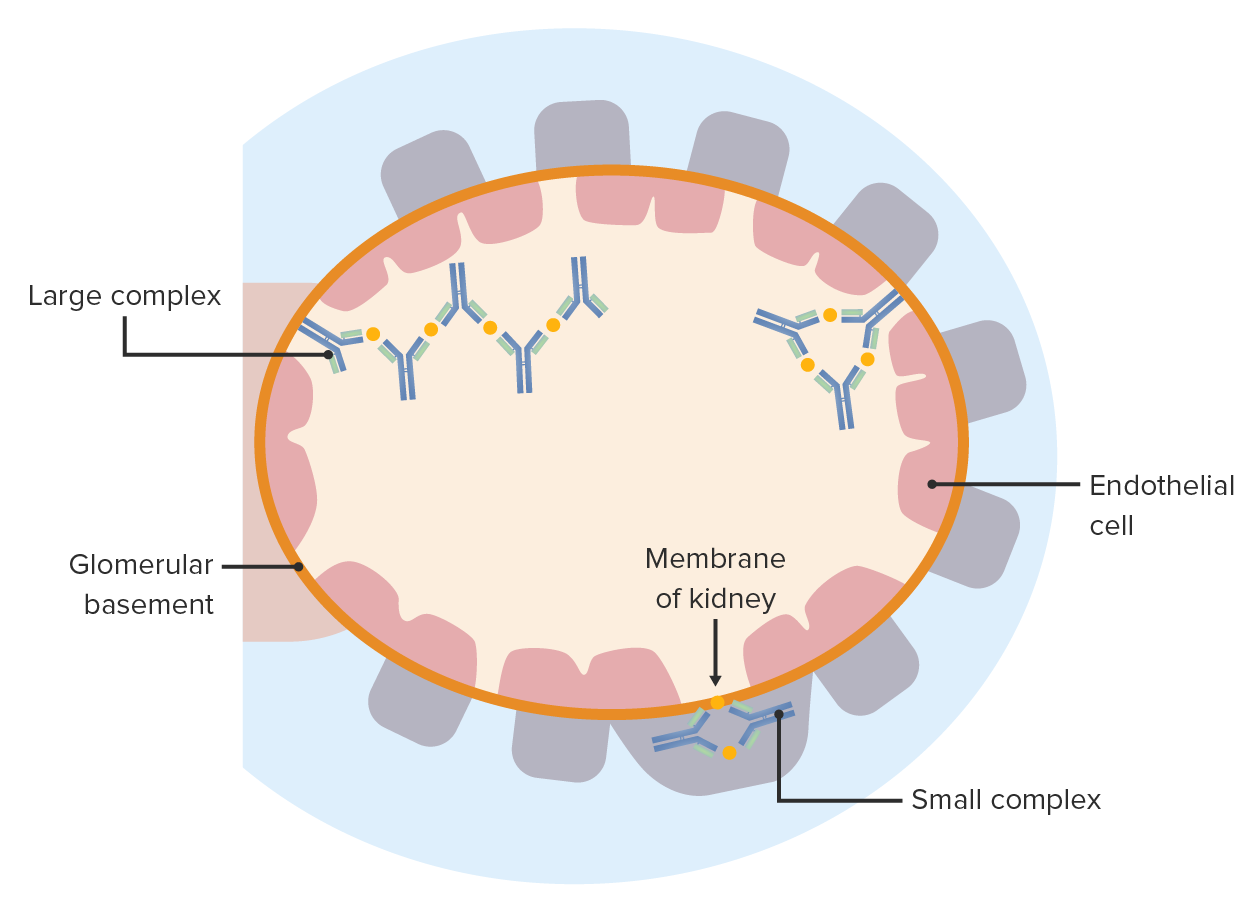Playlist
Show Playlist
Hide Playlist
Introduction to Type III Hypersensitivity
-
Slides Immune-mediated Diseases Type III.pdf
-
Download Lecture Overview
00:01 That's been a flavour of type two hypersensitivity. 00:06 We're going to now kind of go into type three hypersensitivity which will continue in the next lecture as well. 00:12 So this is immune complex disease related to antigen antibody complex formation. 00:19 I'm showing you an example of administering a particular antigen at a very high level. 00:27 Then this could be in an experimental animal, it could be giving them a foreign albumin. 00:34 In humans, we actually did this back in the day when we were administering horse serum that contained antibodies against the theria. 00:43 And we were trying to cure patients of having diptheria toxin induce cellular death. 00:51 And we would give those antibodies, and that would block the dip there and it worked great. 00:54 It was a neutralizing antibodies. 00:56 But in that horse serum that we were administering to the patients to save their lives from diptheria, there are a lot of other horse proteins in particular horse serum albumin. 01:07 So we would give a large dose to the patients. 01:10 And we would notice it pretty reliably after we did that. 01:14 Usually on the second dose, seven to 10 days later, we got a profound joint inflammatory response, a skin rash, patients could have even had difficulty breathing. 01:26 And it turns out, it's all due to the formation of immune complexes. 01:30 So here at times, here, we've administered a very large dose of a particular antigen, let's say horse serum albumin, and it has a long circulating half life and will eventually be of various mechanisms, including filtration, destruction, and formation of immune complexes go away. 01:49 So at times zero, we administer the antigen. 01:53 Fairly reliably because the immune system is working, we are developing antibodies to that antigen. 01:59 And we will begin formulating immune complexes by about day six to seven. 02:05 The formation of those immune complexes means we have less than less than less of the free antigen circulating and eventually everything goes away at 14 days. 02:12 And obviously, the immune complex is due too. 02:15 Kind of midway at that point as we're forming immune complexes about they can or so. 02:20 If we were measuring it, we would see that the complement level in this patient who received this massive dose of an antigen, the complement level is beginning to diminish. 02:30 That's because it's being consumed due to the formation of immune complexes that are activating the complement cascade. 02:40 At about 14 days, we have lots and lots of free antibody, but there's no more antigen around. 02:47 So that's why we have free antibody and all the antigen has gone away. 02:52 But what was noticed, and what happens pretty reliably is about between a date days, eight and 14 before all the complexes go away, we started getting all these immune manifestations. 03:03 We get a rash, we get joint pain, we have a variety of inflammatory things. 03:09 That's due to immune complex deposition. 03:12 So as we form immune complexes, they're depositing in various vascular beds, activating complement, recruiting FC receptor bearing cells. 03:20 Again, in a predictable way. 03:24 The reason that we're starting to see a lot of disease at this point is because we are in a zone where we have a lot of small immune complexes. 03:34 Those small immune complexes are not very easily cleared, but they will induce complement activation when they deposit. 03:40 They will activate FC receptor bearing cells as they deposit. 03:46 So with that, we've set the stage to talk about immune complex mediated disease, which will be part of the next session.
About the Lecture
The lecture Introduction to Type III Hypersensitivity by Richard Mitchell, MD, PhD is from the course Immune-mediated Diseases.
Included Quiz Questions
Which of the following mechanisms is involved in a type III hypersensitivity reaction?
- Deposition of immune complexes in tissues and small blood vessels
- Release of vasoactive amines and cytokines from mast cells
- Antibody-dependent cellular cytotoxicity
- Cell-mediated cytotoxicity
- Autophagy
In a type III hypersensitivity reaction, how many days after initial antigen exposure do the serum complement levels typically drop?
- 10 days
- 5 days
- 2 days
- 14 days
- 18 days
An immune complex comprises which of the following components?
- Antibody and antigen molecules
- Antigen molecules
- Antibody molecules
- Complement molecules
- Histamine molecules
Customer reviews
5,0 of 5 stars
| 5 Stars |
|
5 |
| 4 Stars |
|
0 |
| 3 Stars |
|
0 |
| 2 Stars |
|
0 |
| 1 Star |
|
0 |




